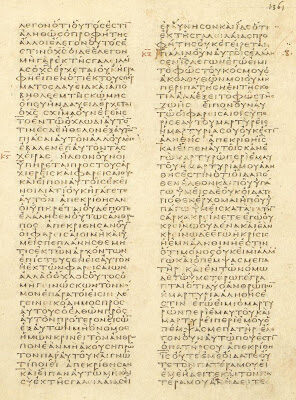We now conclude considering the legend of Bart the gnostic hero Ehrman as he attempts to discredit the Bible and Christianity.
Now, what about the academic/scholarly critiques of Bart Ehrman’s academic/scholarly books? Well, being a man of contradictions, one thing is for certain; he either ignored them or considered them:
There were actually three books written against Misquoting Jesus. That was one of them. And there are a lot of Web sites and blogs and things that attack me. The way I deal with that is by not reading them. [Laughs.]…
I don’t feel a need to respond to my critics or anything like that…
in Jesus, Interrupted, I do talk a little bit about the response to Misquoting Jesus…
I point out in this chapter [How We Got the Bible] is that nobody has disagreed with any of these eight or nine major theses, because they’re true. I think people have objected to the tone of the book maybe, or they don’t like the fact that I talk about how I changed my view of the Bible because of these differences in the manuscripts, but nobody disagrees with any of the scholarship in the book. I think that’s significant…
I answer just about every e-mail except for e-mails that are antagonistic…1
Thus; yes, no, maybe so. He does not bother reading criticisms and does not respond to them except when he reads them and responds to them—sort of, since he has not corrected his demonstrable errors.
It seems that overall no, he does not take criticism into consideration if he thinks that people are only expressing opinions about his tone and if he really thinks that “nobody disagrees with any of the scholarship in the book” against whom has he been debating? I would strain my cognitive functions and conclude that it is against people who disagree with his scholarship. I have yet to hear any of his debate opponents premise their case on his tone.
I wish to take an apologetics aside and focus momentarily upon this related statement:
I get a lot of e-mails from people who agree with me, with what I say about the New Testament, but if I would just join their religion I wouldn’t have these problems. Those people tend to be either Muslim or Mormon. [Laughs.] A couple days ago I got something from somebody who was Baha’i who thought I should join the Baha’i faith…I think it’s a free world. They’re welcome to convert me. I’m welcome to convert them.2
This is fascinating because:
1) It is reported that Muslim have done a good job of transmitting the contents of the Qur’an. Yet, the reason that there are no original manuscripts (autographa) of the Qur’an is not that they were lost to the ravages of time but that they were lost to the purposeful fires of Caliph ‘Uthman.
Variants became such as concern that ‘Uthman had all manuscripts collected, he concocted an authorized version and destroyed the various variant manuscripts (find information on the issue of how the Qur’an came to be in the first place and more at this link).
2) Mormonism’s eighth Article of Faith states, “We believe the Bible to be the word of God as far as it is translated correctly; we also believe the Book of Mormon to be the word of God.” The question is: how do they know when it is translated correctly? It is not due to a consideration of the original languages, a comparison of the translations and a retranslation by Mormons to a correct version? The answer is all too simple: when they can use it to affirm Mormon doctrines, it is declared translated correctly but when they cannot, or when it contradicts them, it is not. This is not about translation but about utilitarianism.
Consider, for example, that the Bible and for that matter the Book of Mormon are monotheistic and let us ask: why are Mormons henotheistic? Because their “prophets” have told them that there are very many gods and so the Bible and Book of Mormon are discarded at this point (find information on Mormonism at this link).
3) In this regard, the Baha’i Faith is very much like Mormonism as, on the surface, they affirm that the Bible is divinely inspired but they discard it, via claiming symbolism, etc., whenever it conflicts with Baha’i doctrine. For example, they flatly reject the doctrine of physical resurrection; an absolutely essential Christian doctrine (find information on the Baha’i Faith at this link).
Thus, we continue to find that Bart Ehrman, the man, the myth, the legend, the emotive, makes impressive claims but with a little consideration they are exposed for what they are: excuses for rejecting God.

